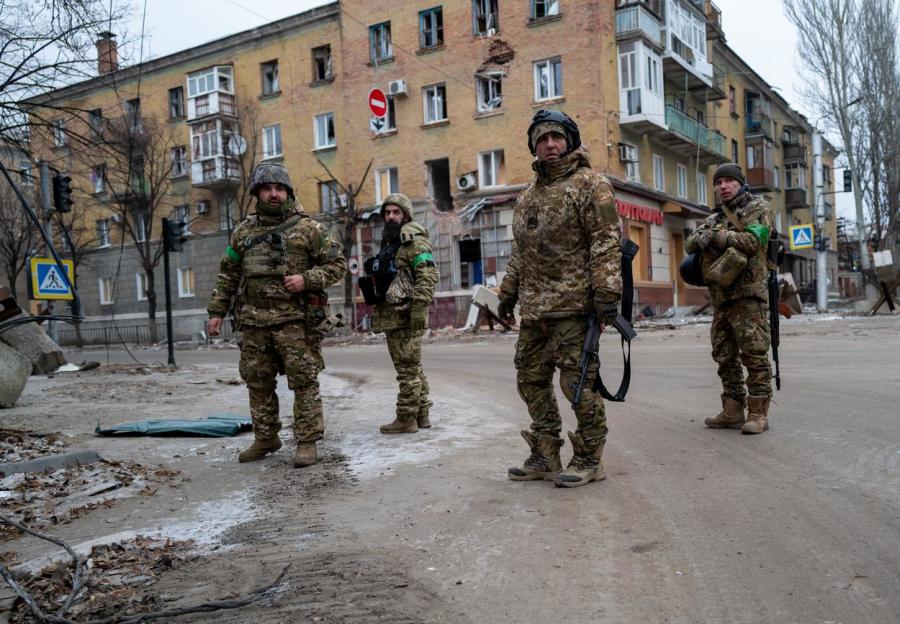A Ukrainian soldier walks through the heavily damaged city of Bakhmut, which became one of the fiercest battlefields in the nearly year-long war between Ukraine and Russia as of January 13, 2023. (Photo by Spencer Platt/Getty Images)
[People News] On the internet in mainland China, there is frequent propaganda suggesting that iron-blooded soldiers must embody a spirit of 'fearless of hardship, fearless of death'; they should possess a selfless attitude in peacetime and a disregard for death in wartime, demonstrating bravery in battle and confidence in victory. But is this truly the reality?
1. POWs appeal to Xi Jinping, 'We want to go home'
In April of this year, during the Ukraine-Russia conflict, the Ukrainian army captured two Chinese soldiers for the first time, attracting significant attention. One of them, 34-year-old Wang Guangjun from Henan, called out to Party leader Xi Jinping, asking to be brought home. He explained that he had been deceived by a mainland agent into coming to the Russian front due to unemployment, with the promise of a logistics position that would pay him 19,000 yuan per month, but he was required to pay 27,300 yuan in agency fees upfront.
A moment of impulsive decision-making, combined with childhood dreams of military service, led this middle-aged man, who lacked military training, to the battlefield. He officially joined the Russian army at the end of March 2025, having only undergone six days of training in chopping wood and ammunition boxes. The food and living conditions were abysmal, with only one meal provided each day, no water available, forcing him to eat snow, and living in a leaking bunker. The attitude of the Russian soldiers was also poor, as they kept everything regarding the Chinese soldiers confidential. They confiscated his phone and bank card, preventing any chance of escape. His experience illustrates that trading one's life for someone else's promise is essentially being scammed.
After just three days on the battlefield, he was captured by Ukrainian forces, witnessing his comrades being blown away, while Russian soldiers who surrendered slowly were killed by their own troops. With a wife and children waiting for him, all he desires is to return home.
Netizens have remarked: "I wish I could help, but such videos cannot be shared within the Great Firewall."
"Xi Jinping is worried that you little brat has mastered martial arts, and the first thing you'll do upon returning home is pledge loyalty to the city government."
"To dare to directly address Xi Jinping puts you in a league above 99% of the Chinese population."
"If you spend a few years in Ukraine, you might even acquire EU citizenship! But when you return, you’ll just end up in prison—how naive!"
Another captured individual is Zhang Renbo, a firefighter from Jiangxi born in 1998. During a press conference on April 14, he criticised the Russian government and urged Chinese citizens not to fight for the Russian army.
On July 4, when Russia bombed Ukraine, it struck the Chinese consulate in Odessa, demonstrating that the CCP's unwavering support for Russia has only led to cold indifference and cruelty.
2. Chinese Individuals on Two Battlefields: Diverging Paths
Chai Jing, a former CCTV reporter now residing overseas and an independent journalist, conducted comparative interviews with Chinese soldiers on the Russian and Ukrainian battlefields. Indeed, war is brutal for the low-ranking soldiers on both sides. However, it is clear that the treatment of Chinese soldiers by the Ukrainian military is significantly better. First, Chai Jing compared the earnings of both sides: Russian soldiers earn 15,000 a month, while their Ukrainian counterparts earn 25,000. Although Chinese soldiers do not admit they came for the money, Chai Jing argues that financial compensation is essential.
The soldiers from the Ukrainian battlefield were once part of the so-called 'little pinks,' but in reality, they are young people marginalised by the CCP. They bring their own equipment and step onto the battlefield, forming close friendships with former imagined enemies, the Taiwanese, amidst the chaos of war, ideologically converging in their fight for freedom and peace. At this moment, both Taiwanese and mainland Chinese suddenly realise that they are all part of the same Chinese identity.
In contrast, the Chinese soldier Makaron on the Russian battlefield was interviewed while being held in a dungeon. He wanted to go home as his contract was expiring, but the Russian side refused, confiscating all his documents and bank cards. They informed him that he would be sent to the assault team as soon as he left the dungeon, and he wouldn't be able to return home until the war was over. He understood that this meant he would never go back.
3. In the midst of war, people from the mainland and Taiwan have achieved unification.
Chai Jing stated that for Gao Shan, who grew up in the mainland, his closest comrade in the war is the indigenous Taiwanese, Zeng Shengguang. The two share a bowl of noodles, take shelter from the rain together, and care for stray dogs caught in the conflict.
Their friendship transcends the hostility instilled in them since childhood. Although they both deeply love their hometowns, neither wishes to go to war against the other. The inhumane nature of war holds no meaning for ordinary people.
In contrast, the Chinese soldier Makaron on the Russian battlefield receives no concern from the Russians about whether he needs communication or comfort. In his loneliness, he can only talk to the rats in the dungeon.
4. Awakening of the people on the battlefield.
A recent report from the China Aerospace Studies Institute (CASI), a U.S. Air Force think tank, cited remarks from Zhang Youxia, stating that the military is "not yet prepared for an immediate invasion or blockade of Taiwan," indicating that under current conditions, the PLA soldiers are not yet capable of executing large-scale joint combat missions.
External commentators have noted that in Chai Jing's video, we witness Zhang Youxia's clarity of thought. It is possible that in a future conflict over Taiwan, when soldiers actually find themselves on the battlefield, the repeatedly propagated 'wolf warrior myth' will eventually collapse, leaving in its wake a longing for freedom, a desire for peace, a quest for justice, and the most genuine friendships forged in the fires of war. The party that instigates the conflict may find itself defeated without even engaging in battle.
When war arrives, it may not be the people of Taiwan who should feel fear, but rather the Chinese Communist government. What if the populace awakens? △
(Originally published in People News)











News magazine bootstrap themes!
I like this themes, fast loading and look profesional
Thank you Carlos!
You're welcome!
Please support me with give positive rating!
Yes Sure!